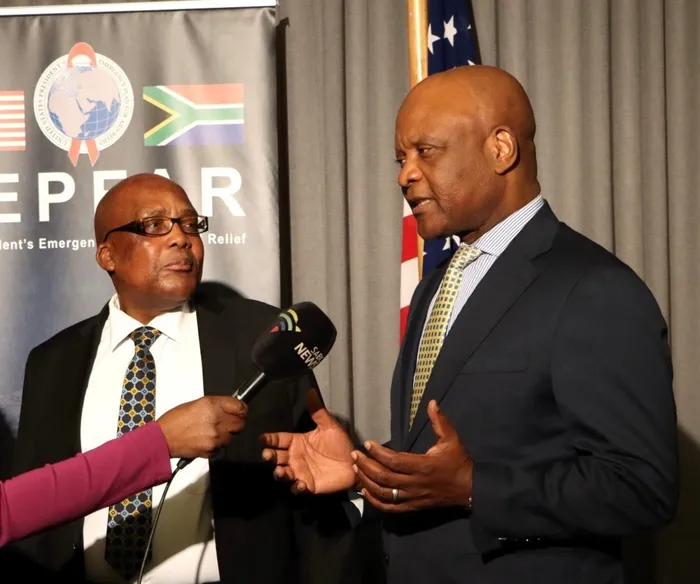Nkengasong hails SA, pushes for HIV/AIDS goals

Amid fears of the upcoming US elections, Global Aids Coordinator Ambassador John Nkengasong hailed the South African government. Picture Twitter.
US elections, Global Aids Coordinator Ambassador John Nkengasong hailed the South African government for its commitment to ending the HIV/AIDS pandemic and encouraged men and youth to play their part ahead of the upcoming ES elections
As South Africa hoped for the next U.S. administration to continue with the President's Emergency Plan for AIDS Relief (PEPFAR), a program addressing the global HIV/AIDS epidemic in developing countries - Nkengasong said the US Congress was in solidarity with South Africa and that they appreciated the efforts being of the government.
Speaking on Thursday alongside Health Minister Dr Aaron Motsoaledi in Pretoria, Nkengasong stressed that he was optimistic that the support would continue, but stated that the US Congress and some of the senators that visited the country in February acknowledged efforts and encouraged the government to create timeframes.
“We are a very proud partner of South Africa. Over the past 21 years, the US has invested eight billion US dollars in support of the South African government where they contribute more than 80% of resources to their efforts to fight HIV & AIDS.
“In February we met and agreed to accelerate our efforts to meet the 2030 goals. South Africa has done a tremendous amount of work in putting people on medication, but this is not enough as we need to continue supporting efforts to end the pandemic,” he said.
He also mentioned that there were six years left before the 2030 development goals to reduce HIV and AIDS.
Motsoaledi said the partnership between the two countries was important as it had saved millions of lives globally.
“In our country, we have more than five million people who are on treatment, we need to ensure that more than seven million are on treatment by 2030, because at the moment we have managed to sedate HIV, now we must eliminate it,” said Motsoaledi.
“The ambassador is correct in saying we can't depend on handouts, but he also appreciated that this is the only country that contributes more, but the cut of funding would also mean that if we stopped, the funds would have gone to waste as we continue in the fight against HIV/AIDS.
Motsoaledi felt that fears over who would win the US elections were not a concern as the Republicans were the ones that had established PEPFAR.
Motsoaledi and Nkengasong encouraged the youth to continue playing active roles in partnering with the government to end the pandemic.
The South African National Aids Council (SANAC) acknowledged that the youth were at the forefront of the fight against HIV, and their voices were crucial in breaking the stigma and advocating for better awareness and access to healthcare.
“It’s important for the youth to also prioritize their health, seek support when needed, and share their experiences with others,” said SANAC CEO, Dr Thembisile Xulu during her message of support at the PEPFAR Special Session on Youth and HIV on Wednesday.
The National Men’s Sector of SANAC Civil Society Forum (CSF) also participated in the PEPFAR Special Session on Men and HIV.
The high-level session was aimed at addressing the unique challenges men face in the fight against HIV.
Some of the participants gave accounts of their experiences when accessing healthcare facilities and asked for assistance in making healthcare more accessible.
A man who identified himself as an HIV/AIDS advocate complained about the bad treatment they received from healthcare workers.
“When we get there late, we are shouted at and they told that we will suffer serious weak erection. At some point, I had to ask my wife to fetch the medication for me because I was scared of being publicly humiliated.
“We don't have HIV & AIDS campaigns, there's a lot of GBV campaigns and we see progress. We hope to have these HIV & AIDS campaigns focusing on men living with HIV & AIDS,” he stated.
According to reports, around 50 000 people died of HIV-related causes and around 7.8 million were living with HIV in South Africa in 2023. This is according to new estimates from Thembisa, the leading mathematical model of HIV in South Africa.
Of the estimated 7.8 million people living with HIV in South Africa in 2023 (12.6% of the population), just under 5.9 million were on treatment. This translates to treatment coverage of 75%, or one in every four people living with HIV not being on treatment.
Antiretroviral treatment is recommended for all people living with the infection.
thabo.makwakwa@inl.co.za
Sunday Independent
Related Topics: